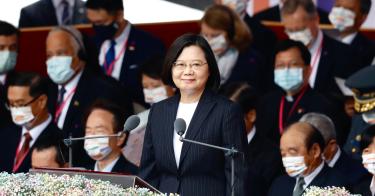The U.S. last week took action to remove most of the diplomatic red tape around U.S.-Taiwan relations. While there have been adjustments in State Department “Guidelines on Relations with Taiwan” and other guidance before, no administration has ever so thoroughly dispensed with them. It is a step in the right direction.
Of course, when there is a policy of formally recognizing one government (the People’s Republic of China or PRC) and not another (the Republic of China or ROC), officials from the top of government down need a systematic way of operationalizing the distinction. They cannot just make it up as they go.
So, yes, there will continue to be a distinction. Even in the Secretary of State’s announcement, there is no hint of doing away with the American one-China policy altogether. To the contrary, the statement references “unofficial” relations with Taiwan and the special role played by the American Institute in Taiwan (AIT) in this regard.
The response from the incoming Biden team has had a similar focus, reiterating both the one-China policy and the Taiwan Relations Act as the basis for a way forward.
So ultimately, there will be guidance. The only question is what it will be. Congress mandated that diplomatic restrictions be reviewed as part of the Taiwan Assurance Act, originally sponsored by Rep. Michael McCaul (R-Texas) and Sen. Tom Cotton (R-Ark.) and signed into law just two weeks before Pompeo’s policy announcement.
Congress made clear what it thought the review should take into account, including due consideration for Taiwan’s democracy and the peaceful resolution of cross-straits issues. The suggestions were very broad. One thing is certain, however: Congress expects a liberalization. Going backwards is not acceptable.
Here are a few ideas for what should permanently change about the way the U.S. interacts with Taiwan.
Give Taiwan government officials routine and consistent access to U.S. government buildings, including White House offices and State Department facilities, both at home and abroad. Requiring Taiwan officials to meet U.S. officials off-site is not giving “due consideration” to the democratic nature of Taiwan’s system—as called for in the new law. It is humiliating.
Remove restrictions on the use of Twin Oaks, Taiwan’s would-be diplomatic residence in Washington, D.C. It may be here that the pettiness of the diplomatic guidelines have been clearest, the permissible displays of Taiwan’s flag, for instance. The State Department should allow TECRO to use Twin Oaks as it sees fit, including, if Taipei desires, as the official residence of its Representative. It should also allow State Department officials to attend events and meetings there.
Allow high-ranking officials from Taiwan to visit the U.S., and Washington, in particular. It makes no sense that Taiwan’s Minister of National Defense is not permitted in Washington, D.C., or that the President and Vice President of Taiwan are not permitted in the U.S. at all, except for transit visits. The State Department should also widen the aperture for visits by its officials to Taiwan. It is good that the Undersecretary of State for economic affairs visited last year. The Biden administration should continue the practice. It should also send the Assistant Secretary of State for East Asian and Pacific Affairs and the deputy assistant secretary principally responsible for Taiwan.
Now, the more cautious will insist that these things are wasted diplomatic effort. They denigrate cabinet-level visits to Taiwan the same way, insisting that “Washington should be focused on real policy, instead.” The problem is that these voices are just as cautious when it comes to those other “real” areas, too.
The diplomatic regulations matter because they set the baseline for U.S.-Taiwan relations. If you are worried about what kind of letterhead government officials use in correspondence with their Taiwan counterparts, chances are you are probably sensitive to Beijing’s objection to a U.S.-Taiwan Free Trade Agreement or sale of jet fighters to Taiwan.
Secretary of State Pompeo is right to scrap current guidelines governing U.S.-Taiwan relations, and Congress is right to call for a general revision. As Senate Foreign Relations Committee Chairman Jim Risch (R-Idaho) said when the Taiwan Assurance Act passed, the U.S. needs a relationship with Taiwan that reflects today’s—not 1979’s—geopolitical situation.
Whether the timing of the State Department move is right depends on what you expect from the Biden administration. If you think it is headed back to Obama’s China policy, you should be worried. Anthony Blinken and company will just reverse it all and then some—Congress be damned. If you think, as I do, that times have changed for Democrats and Republicans alike, and that neither has a monopoly on concern for Taiwan, then the timing is perfect. Reforming the policy—for the good—cannot be put off.
This piece originally appeared in Taipei Times



